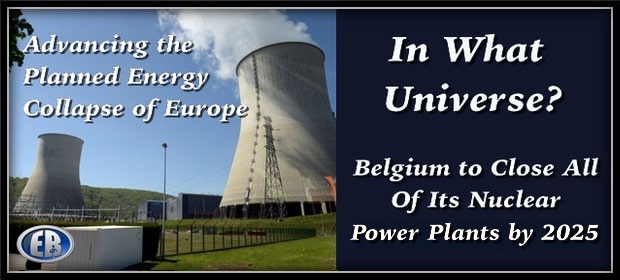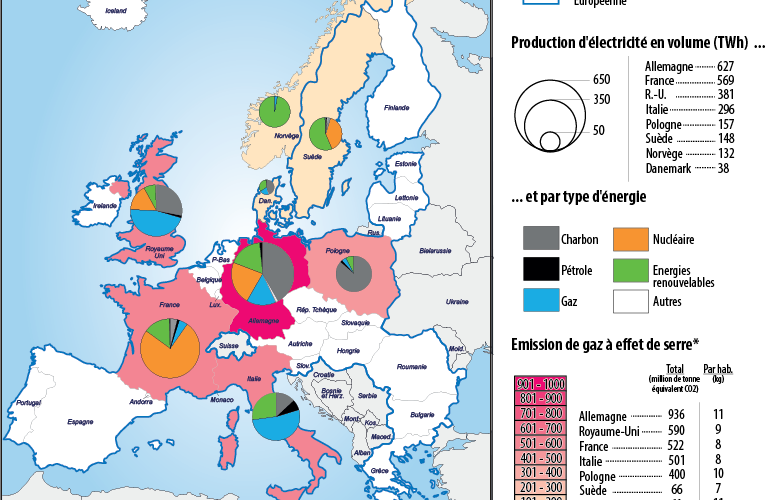
Belgium will close its nuclear power plants in 2025: one more step towards the energy suicide of Europe
EDOUARD HUSSON
On December 23, 2021, the Belgian government confirmed its decision to close the country’s seven nuclear power plants by 2025.
At a time when an energy shock is looming that could have the violence of the oil crises of the 1970s and when Russia is increasingly asserting its geopolitical authority, the European Union is confirming that it has neither vision nor ambition to achieve a form of European independence.

After a laborious discussion and a tug of war between the Liberals and the Greens, the latter won the day: the announcement was made this morning, December 23, that Belgium would indeed close all its nuclear power plants by 2025.
With energy prices soaring in Europe, the Liberals were in favour of keeping the plants in operation, at least until the energy situation in the European Union had stabilized. However, the Minister of Energy, Tinne Van der Straeten, has won her case. This Flemish environmentalist presented a report on December 3 that goes in this direction. It is “the solution that presents the least difficulty”, she pleaded. Prime Minister Alexander De Croo finally decided in her favour.
Belgium will nevertheless invest 100 million euros in new nuclear technology, in particular in small modular reactors (SMR). But this does not change the catastrophic nature of this decision, taken at the worst possible moment.
A Europe that deprives itself of energy independence
The Belgian decision is absurd. It comes at a time when the European Union is experiencing a surge in energy prices that could take us back to the time of the oil crises. Partial (in France) or complete (in Germany, in Belgium) closures of nuclear power plants; poor results of wind turbines; increasing dependence on Russian gas etc….
Europe is paying dearly for a series of factors:
+ the taking in hand of the notion of the third industrial revolution by ideologists, Jeremy Rifkin in the lead. In 1980, a symposium was held in Epinal to analyze the transformation in progress: the participants in the symposium tried to grasp this change “which was then beginning to emerge, taking its full swing in the 21st century, based on nuclear and renewable energies, centered on the electronic sector, transmitted by digital technologies, supported by biochemistry”. Unfortunately, when he began to popularize the results of the conference, Jeremy Rifkin made nuclear power disappear from the energy base of the new industrial revolution. And generations of ideologists followed him in believing that we could move to decarbonized energy without including nuclear.
+ On top of this came the French inability to defend the nuclear industry in Europe. A privileged relationship with Germany was allowed to develop, even though there was a radical difference between the two countries on the subject. Then there was the rise of the Greens in French politics and finally the disastrous closure of Fessenheim by François Hollande and the partial dismantling of the industry by himself and his successor Emmanuel Macron. It was not until 2021 that France began to fight to put nuclear power in the package of decarbonized energies supported by Brussels – without certainty of success. A Europe where France has less and less influence and where Germany leads the way is a Europe that does not have the means to be energy independent.
+ Finally, the European Union is unable to overcome the contradiction of becoming increasingly dependent on Russia for gas deliveries while at the same time wanting to side with the United States against Russia in geopolitical matters. It is obvious that if the EU had continued to develop the nuclear industry, it would be less dependent on Russia.
************
Source

••••
The Liberty Beacon Project is now expanding at a near exponential rate, and for this we are grateful and excited! But we must also be practical. For 7 years we have not asked for any donations, and have built this project with our own funds as we grew. We are now experiencing ever increasing growing pains due to the large number of websites and projects we represent. So we have just installed donation buttons on our websites and ask that you consider this when you visit them. Nothing is too small. We thank you for all your support and your considerations … (TLB)
••••
Comment Policy: As a privately owned web site, we reserve the right to remove comments that contain spam, advertising, vulgarity, threats of violence, racism, or personal/abusive attacks on other users. This also applies to trolling, the use of more than one alias, or just intentional mischief. Enforcement of this policy is at the discretion of this websites administrators. Repeat offenders may be blocked or permanently banned without prior warning.
••••
Disclaimer: TLB websites contain copyrighted material the use of which has not always been specifically authorized by the copyright owner. We are making such material available to our readers under the provisions of “fair use” in an effort to advance a better understanding of political, health, economic and social issues. The material on this site is distributed without profit to those who have expressed a prior interest in receiving it for research and educational purposes. If you wish to use copyrighted material for purposes other than “fair use” you must request permission from the copyright owner.
••••
Disclaimer: The information and opinions shared are for informational purposes only including, but not limited to, text, graphics, images and other material are not intended as medical advice or instruction. Nothing mentioned is intended to be a substitute for professional medical advice, diagnosis or treatment.





This article does not take into consideration that some of these Belgian nuclear reactors are dangerously reaching 50 years of their operational life and there had been numerous government extensions to their operational life. These are high pressure water reactors. Do we have to wait for a disaster before we close down these old reactors? There have already been cracks and leaks discovered in the pressure vessels.
Why is there no government policy to research and replace them with Thorium salt reactors like in China? There are at least 3 advantages of Thorium salt reactors. 1) Easily available fuel material unlike dangerous Uranium mining. 2) no high pressure cooling water needed so no radioactive steam escaping into atmosphere via cracks or leaks in the HP vessels. 3) Difficult for end products to be used to make nuclear weapons.